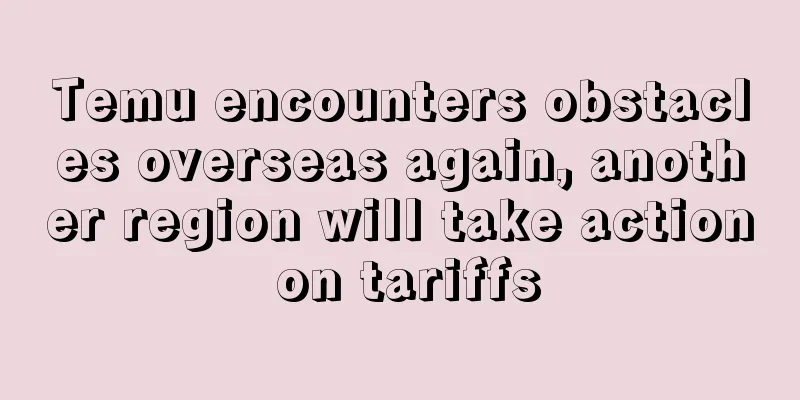Temu encounters obstacles overseas again, another region will take action on tariffs

|
Last week, Temu was officially launched in Brazil. So far, Temu has 70 overseas sites.
Coincidentally, the day before Temu Brazil officially launched, the Brazilian Senate voted to pass a proposal to "impose a 20% tariff on imported cross-border goods worth less than $50." Earlier, it was also reported that the German Finance Minister said that Germany would support the abolition of the 150 euro tax-free limit at the European level. Obviously, in addition to the United States, other countries are also taking action against low-priced packages.
According to the latest news circulating on the Internet, South Africa is another country that will impose tariffs on small packages. Starting next month ( July 1), low-value and small-volume clothing orders on platforms such as Temu will be subject to a 45% import tax and value-added tax. The change comes after local clothing retailers and stakeholders accused platforms such as Temu of exploiting tax loopholes to drive down the prices of imported clothing, with the South African government hoping the new tariffs will provide a more level playing field for local retailers.
It is reported that the current "minimum tax rate" rules allow Temu and other platforms to pass customs with only a 20% tax on clothing packages worth less than 500 rand, but local clothing retailers need to pay an additional 45% VAT on their imported clothing. They believe this puts them at a significant disadvantage compared to Chinese competitors.
For example, currently South African consumers who order goods worth 100 rand from Temu only need to pay 20 rand in tariffs and no value-added tax, for a total cost of 120 rand.
However, from July 1, for the same 100 rand order, consumers will need to pay 45 rand import tax and 21.75 rand value-added tax. The total price of the order will increase from the current 120 rand to 166.75 rand, an increase of 39% compared with before.
National Clothing Retail Federation ( NCRF) executive director Michael Lawrence said he was pleased with the news and believed it was urgently needed.
Anthony Thunström, CEO of The Foshini Croup (TFG), a large local clothing retailer in South Africa , also said, "This is a major move that will help the local industry, including local production and employment."
Over the past two years, NCRF and the Southern African Clothing and Textile Workers Union (Sactwu) have been lobbying the South African Revenue Service (SARS) to take action against platforms such as Temu. In response to accusations from local retailers, a Temu spokesman said that the platform's competitive prices come from supply chain efficiency and operational expertise, rather than circumventing rules or exploiting tax loopholes.
As it stands, the adjustment only affects clothing. Other goods, such as small electronic products that are also cheap and popular in Temu, are not affected by the import duties. Temu South Africa tariff |
<<: After becoming the number one category on Amazon, it became popular again on TikTok
>>: The seller called the police and a service provider was disbanded today?
Recommend
The prospects are bright! Amazon sellers received nearly 100 million yuan in financing
In recent years, the demand for medical and healt...
ONT8 warehouse explosion intensifies! Popular FBA warehouses are difficult to book and build warehouses
Popular FBA warehouses are difficult to book and ...
What is Luxury Promise? Luxury Promise Review, Features
Founded by Sabrina Sadiq in 2017, Luxury Promise i...
2021 Amazon Display Advertising Detailed Strategy Guide
Part 1 Introduction to SD advertising and the thr...
OnBuy and PayPal establish long-term partnership
With the development of the e-commerce industry a...
Amazon released a new announcement, and many fees have increased across the board!
Yesterday, Amazon sellers just woke up from their...
eBay to cease operations in Spain on July 1st?
According to Spanish news reports, eBay will clos...
Please note that many countries have discovered new coronavirus variants and have announced flight bans
Many countries around the world are currently pre...
Sales volume reached 56,200 pieces! A product on Amazon was urgently removed from the shelves
In the past two years, due to the influence of th...
Online grocery penetration in the U.S. is expected to reach 55%. How can retailers maintain growth momentum?
According to Forbes, in the year of the global ou...
Shinsegae acquires 80% stake in eBay Korea for $3 billion
According to Korean media reports, on June 24, Sh...
Amazon releases new policy and will update compliance reference tools
Yesterday, Amazon US released a new announcement,...
Charles raises €6.4 million in seed funding to bring ‘conversational commerce’ to WhatsApp
According to techcrunch, Charles, a startup based...
What is Drunk Elephant? Drunk Elephant Review, Features
Drunk Elephant is a representative of pure beauty...
Alibaba International Station obtains Singapore MPI license: the security of cross-border financial services is recognized by authoritative institutions again
Recently, Alibaba International Station has recei...









